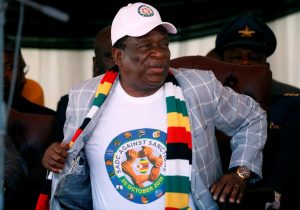
Zimbabwe President Emmerson Mnangagwa attends a rally against Western sanctions in Harare, Zimbabwe October 25, 2019. REUTERS/Philimon Bulawayo
From preachers to teachers, those who stand up to Zimbabwe’s rulers risk being beaten, jailed or worse.
In the past few weeks alone, masked men have abducted and tortured a doctor, a female comedian and a singer whose lyrics were deemed to insult Emmerson Mnangagwa, the president.
A market trader in Harare was beaten so badly that he died.
Now, however, the regime faces a less vulnerable critic: the American ambassador.
His straight-talking upsets the government so much that it is threatening to kick him out.
Brian Nichols has visited victims of violence from state security forces, posting photographs of himself with them.
But what really upsets the regime is a series of tweets in which he has revealed extensive details of its corruption.
The trigger for this was an attempt by Mnangagwa to blame America and the EU for a looming famine that the UN describes as Zimbabwe’s “worst ever hunger crisis”.
Half the population is running out of food.
The real causes are years of mismanagement and a severe regional drought, but Mnangagwa has tried to pin responsibility on American and EU economic sanctions.
Although these apply only to members of his regime and related companies, the president has erected billboards across the country proclaiming “Sanctions — a crime against humanity”.
Nichols, experienced at fighting mafia as a former counter- narcotics expert, hit back, initially with a YouTube interview, pointing out that America is the biggest donor to Zimbabwe and the country’s real problems are corruption and economic mismanagement.
“If you don’t want people to say bad things about you, maybe don’t do bad things,” he suggested.
Nichols wrote, in a column for an independent newspaper, Newsday: “Our targeted sanctions are not responsible for Zimbabwe falling tragically short of its potential.
The fault lies in catastrophic mismanagement by those in power and the government’s abuse of its own citizens.”
The regime ramped up the confrontation nine days ago with an official Anti-Sanctions Day, closing schools and bussing people to a rally attended by Mnangagwa, his wife and the cabinet.
Nichols responded with almost hourly tweets with the hashtag #ItsNotSanctions, detailing corruption he said amounted to $1bn (about £775m) a year. “$2.8bn disappeared from agricultural subsidies,” he wrote.
“$25m from national road administration, $4.9m from the Zim electricity company for transformers never delivered.” Another tweet read: “Diamonds worth $10m would fund water treatment chemicals for Harare for 4 months that Zimbabweans desperately need.
But they were shipped out of the country for ‘training purposes’.” And: “$51m to lease three planes never used.”
The White House then added Owen Ncube, Zimbabwe’s state sunday november 3 2019
security minister, to the list of those sanctioned, banning him from travel to America.
The regime was furious. On Thursday night General Sibusiso Moyo, the foreign minister, wrote to the ambassador, accusing him of “behaving and conducting himself like some kind of opposition member, with complete disregard for all norms of permissible diplomatic protocol”.
He added: “Persistent behaviour of this nature will test the patience of even the most tolerant . . . We have the means to bring all this to an end.”
For Zimbabweans such words would be a clear warning — 17 people were killed in a crackdown this year. But an American envoy is a different matter.
The US State Department said: “Promoting freedom, democracy and transparency and the protection of human rights are central to US foreign policy.”
Post published in: Featured

